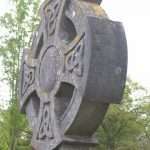Mysterious men
The neighbour had come from the North Inner City, growing up a member of a parish regarded by many as ‘High Church’. A working class Dubliner, he had enjoyed playing football and a pint of beer and, unlike his counterparts across the water, going to church on a Sunday morning. Church was part of who he was, and when he moved to the country, it continued to be so. He would drive to church to receive Communion regularly.
While he may have been a regular churchgoer, his friends were not, but would come if there were Holy Communion service in his house. It seemed odd, but there were always two or three who would come and sit in the kitchen and share in the sacrament.
When the neighbour died, it might have been expected that the Communion services would cease, but instead we moved into the kitchen of one of those who had always been present at the neighbour’s house.
Spotlessly clean, the kitchen is from Ireland of the 1960s. A large Calor gas bottle sits beside the cooker. The worktops are blue formica. Brown linoleum covers the floor. It could be the set for a period drama
We sit around a big wooden table – a man in his eighties, a man in his fifties, a man in his thirties. The age range is of no consequence to their friendship. One worked in England but returned; two are farmers; the three of them never attend church.
What is it that prompts them to gather in a farmhouse kitchen six times a year to join in the Sixteenth Century words of a religious ceremony? They are not religious, they seem not particularly spiritual, but this moment will have been on the calendar for weeks.
Sitting there, it is hard to fathom. Is it that the words of the old Communion service allow them a sense of the spiritual realm that may have been intimidating if they had encountered it through the less nuanced language of the new prayer books? Is it that they feel secure in a farmhouse kitchen while they would not have felt that degree of security if they had been sitting in a church? Is it a gender thing, that they prefer an all male gathering?
There has been no experience quite comparable to it in previous parishes: three men, who would only be in church if there were a funeral, sharing the broken bread and the thimble sized chalice of wine. Of course, to ask would bring an immediate end to the experience, an end to the time spent sitting at that kitchen table. Confronted with questions, they would retreat into themselves.
If there were some way of explaining the moment, it might be replicated in many other places. As it is, it remains like a meal cooked to a recipe known to no-one.


Comments
Mysterious men — No Comments
HTML tags allowed in your comment: <a href="" title=""> <abbr title=""> <acronym title=""> <b> <blockquote cite=""> <cite> <code> <del datetime=""> <em> <i> <q cite=""> <s> <strike> <strong>